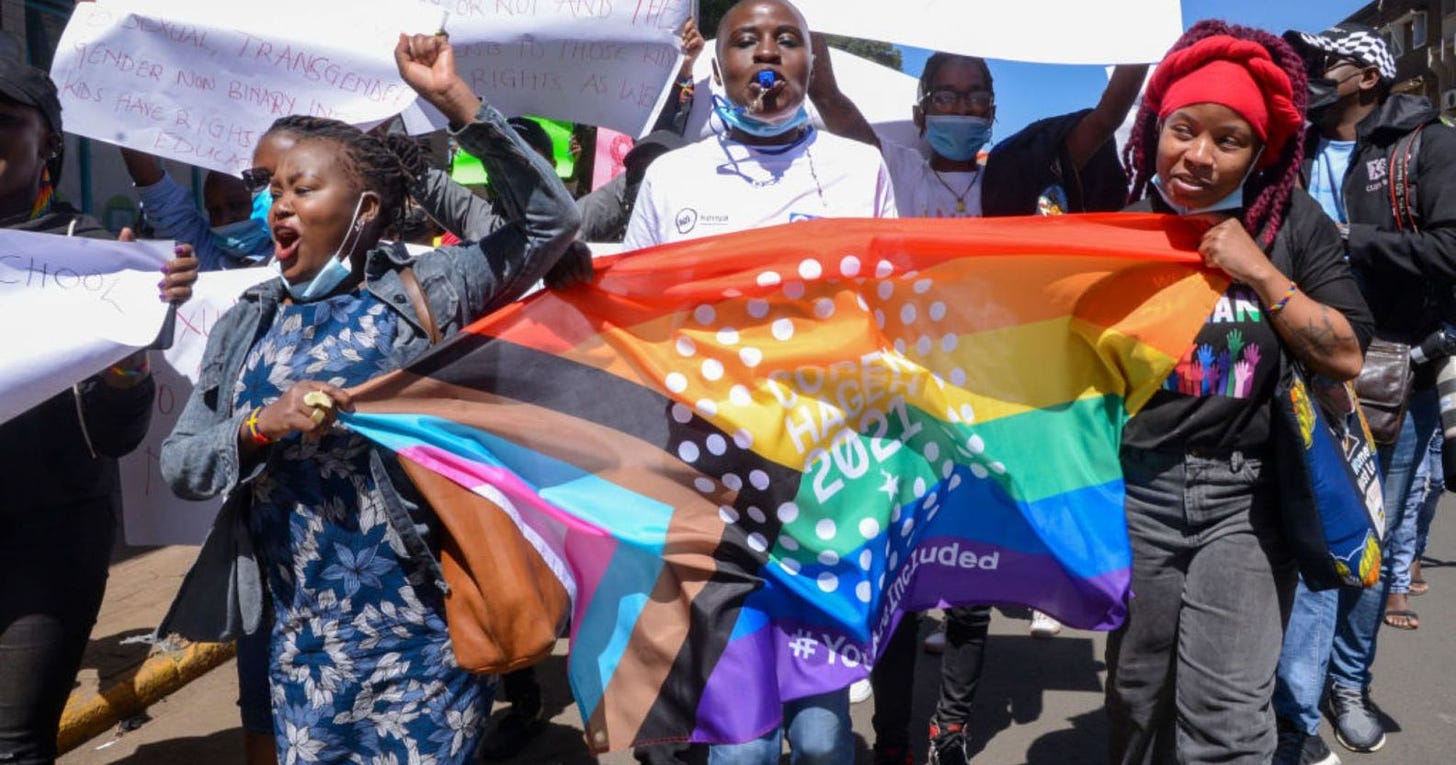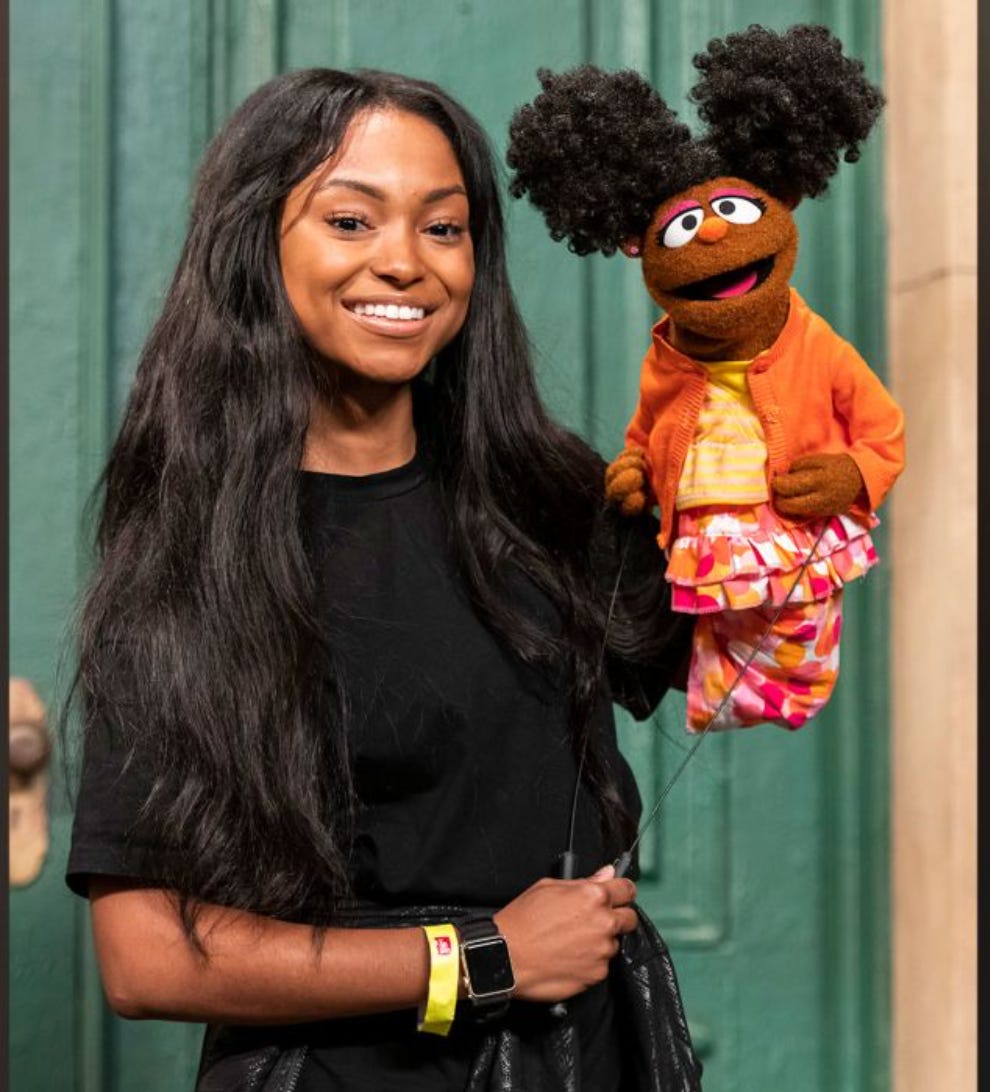Global Roundup: Kenya LGBTQ+ Community Win, Mexico Survivor of Acid Attack, Saudi Feminist Activists #HomeDetainees, Remembering Indonesia Trans Rights Activist, First Black Woman Puppeteer
Curated by FG Contributor Samiha Hossain
Demonstrators are seen marching with an LGBTQ flag during a protest in Nairobi. (John Ochieng/Getty via Pink News)
NGLHRC launched its case in 2013 after its application to be registered as a non-governmental organisation (NGO) was denied. The NGO Coordination Board had refused to register the NGLHRC because its name contained the words “gay” and “lesbian.” Homosexuality is criminalised in Kenya under laws imposed under British colonialism.
The ruling made last week stated: “Given that the right to freedom of association is a human right, vital to the functioning of any democratic society as well as an essential prerequisite enjoyment of other fundamental rights and freedoms, we hold that this right is inherent in everyone irrespective of whether the views they are seeking to promote are popular or not.” The victory was celebrated by the NGLHRC’s current executive director Njeri Gateru.
At a time where the Kenyan LGBTIQ+ community is decrying the increased targeting and violence; this decision affirms the spirit and intention of the Constitution to protect all Kenyans and guarantee their rights. - Njeri Gateru
LGBTQ+ people continue to face significant legal challenges in Kenya – gay sex is a criminal offence, with those convicted facing between five and 14 years in prison. The country also does not recognise any kind of same-sex relationships and there are no protections for LGBTQ+ people on the basis of sexual orientation or gender identity. The ruling is the result of the relentless activism of the LGBTQ+ community and it will certainly fuel them to continue the fight for their rights.
Photo by Ginnette Riquelme / AP via NBC
Ríos, 29, thought her career as a musician and her devotion to her saxophone were what led her former boyfriend to hire the men who splashed acid onto her face and body, disfiguring her. Later, she learned he simply could not accept that she had broken off their relationship. Some of the attackers and the ex-boyfriend are in jail, but Ríos still had to come to terms with her instrument. Her love of the saxophone, in the end, is helping heal the psychological scars left by the terrifying attack.
It bothered my attacker a lot that I was a musician, because he said we musicians were vagrants, poverty stricken, that we just took drugs and that when I went to concerts I probably participated in orgies. -María Elena Río
Ríos has joined a movement calling for greater punishments for acid attacks and says the saxophone is her “sword” in that battle on behalf of victims. Mexico City legislators have proposed a bill bearing her nickname, “Malena,” which would classify acid attacks as a distinct, serious crime equivalent to attempted femicide. Currently they are treated as simple assault or bodily injury. The Carmen Sánchez Foundation, started in 2021 to highlight the issue in Mexico, says government health data from 2022 suggests more than 100 women were attacked by chemicals or some kind of corrosive agent, though only 28 were reported to authorities.
I am not the beautiful young woman who played the saxophone anymore. Today I can say I have been forced to become a defender of my own rights, and a defender of the rights of other fellow women survivors. -María Elena Río
Ríos now attends musical classes in Mexico City, where she has taken refuge since the attack. The federal government has provided her with bodyguards as she has faced harassment given her ex-boyfriend’s influence. She says she lives in constant fear for her life. However, music is now a refuge for Ríos – something she says makes her feel “eternal.”
Image via raseef22
Hundreds of testimonies have been posted via the hashtag "#HomeDetainees" that was launched by Saudi feminist activists on Twitter to demand the abolition of the male guardianship system and grant women their right to movement, independence and decision-making. Many women also shared their experiences of patriarchal oppression to give others in similar situations strength.
The male guardianship system is a structure that essentially grants guardians (a woman's father, brother, husband, etc.) the right to decide women’s fate in terms of education, employment, and health care. Despite Crown Prince Mohammed bin Salman’s implementation of numerous "social reforms" that have given women greater freedom more recently, rights groups and women insist that women’s freedom remains inadequate.
I am still detained, and this detention has no fixed duration. My whole life might be spent in vain, wasting away between these walls. Neither the government intends to drop the guardianship system and its malicious reports, nor does my family intend to stop. -Wedyan
A few tweeters insisted on stressing that women's freedom in Saudi society is not a family affair, as some claim in defense of the state, but rather a political affair. Therefore, the state, even before the family, stands against women's attempts to regain their freedom and their stolen rights.
A man leaves the house to wherever he wants without any conditions and complications. Unlike a woman who must fulfill complex criteria that drain her before the law because she is a woman. Women are still not free. They are imprisoned at home, even if they live in an independent household, since independent women are still under the watchful eyes of men in the street, the owner of the house, and the government. -Twitter user
The campaign managed to reach beyond Saudi Arabia's borders, as Arab women throughout the region reacted to the hashtag and recounted their experiences with “house detention,” pointing out that it is not limited to the kingdom. Others used the hashtag to imagine what their lives would be like if they were not under house detention.
The Towards Feminist Consciousness and Awareness account, which is concerned with women's rights and issues and is followed by about 30,000 people on Twitter, considered the hashtag a "feminist documentation of domestic violence and experiences of conflict, resistance and violence inside the home." It added that it is also "a feminist means of archiving through which female comrades in Saudi Arabia reveal the various ways of feminist resistance and the effects of violence and violations imposed by the patriarchal authority inside homes."
Photo by Dita Alangkara, via Associated Press via NYT
Ratri, who had transitioned as a teenager, founded the school, Pesantren Waria al-Fatah, in 2008, along with two colleagues, as a retreat and a place to pray. For transgender women in the largely Muslim nation, discrimination is particularly acute at mosques, where men and women generally pray separately. As many as 40 students at a time have attended the school, with several of them living there as boarders. They are taught prayers and comprehension of the Quran, and they join in regular prayer services.
Shinta was, and still is, the face of the waria rights movement. She is all over the internet. -Georgie Williams, founder of podcast “/Queer”
Transgender women in Indonesia are known as waria, an appellation that combines the words for woman (wanita) and man (pria). Ratri provided spiritual guidance to many transgender women and advocated that being trans is not a sin. Her words resonated among marginalized and self-doubting transgender women throughout the country.
What she is doing is giving back the humanity to the trans women community. -Mario Pratama, Indonesian L.G.B.T.Q. organizer
Back in December, Indonesia passed a new law that bans sex outside marriage and places strict new limits on free speech. The new rules pose a challenge to transgender women and could be used to target same-sex couples in a country where they are forbidden by law from marrying. Transgender women face widespread discrimination in finding jobs and are generally forced to support themselves with marginal employment, which often includes street performances and sex work.
We are harassed, we are robbed, we are pestered for money. They can call me a transsexual, a transvestite, Dracula or even the devil. -Erni, street musician and former sex worker who is a student at the boarding school
The school faced a defining crisis in February 2016 when a mob from the hard-line Front Jihad Islam raided it and forced it to close for five months. However, Ratri turned it into a lesson in courage and affirmation. She refused to evacuate and insisted on defending the place and their rights when faced with threats on social media. Ratri leaves behind an admirable legacy and has paved the way for transgender activists.
Photo by Zach Hyman/Sesame Workshop via CNN
Piphus Peace learned about puppeteering early on. When she was 10, a woman at her church wanted to start a puppetry team to perform for the children in the congregation, and assembled a group to attend a puppetry conference. There, Piphus Peace was inspired by the women performers she saw. Her parents were incredibly supportive, she said, and helped her find a puppet and videotapes of ventriloquists for her to learn from. Soon, she was performing for her classmates, and then the entire elementary school. Her talents were also on display during her high school valedictorian speech, earning her the nickname “Valedictorian Ventriloquist.” As a college student at Vanderbilt University, she became known as the “Vanderbilt Ventriloquist,” appearing on “The Tonight Show with Jay Leno” in 2012 and on “America’s Got Talent” in 2013.
In 2020, Piphus Peace said she was contacted by “Sesame Street” performers Matt Vogel and Martin Robinson, who asked if she would be willing to learn the signature muppet-style puppetry of the show. It was definitely an adjustment, Piphus Peace said. She was used to doing stage ventriloquism, which involved interacting with puppets without moving the lips. Muppet-style puppetry meant keeping the body out of the camera frame and using monitors to see how the puppets looked on screen. Later that year, Piphus was asked to play Gabrielle in a CNN and “Sesame Street” town hall on racism. It was a daunting prospect for her first “Sesame Street” appearance – she would be a part of helping children process George Floyd’s killing and the Black Lives Matter protests. Later in 2021, she joined as a full-time cast member.
I realized in that moment that I had made history in a show that had already been around for over 50 years. I realized that it would open doors for other Black women, women of color, little boys of color, entering the entertainment space to really see that they can be absolutely anything – no matter how niche or unique. -Megan Piphus Peace
Through her character Gabrielle, Piphus Peace has been able to model joy, curiosity and self-love for a new generation of “Sesame Street” viewers. While Piphus Peace was a shy child, Gabrielle is the confident girl that she aspired to be, she said. And she hopes that Gabrielle can serve as an inspiration to other kids.
Samiha Hossain (she/her) is a student at the University of Ottawa. She has experience working with survivors of sexual violence in her community, as well as conducting research on gender-based violence. A lot of her time is spent learning about and critically engaging with intersectional feminism, transformative justice and disability justice.
Samiha firmly believes in the power of connecting with people and listening to their stories to create solidarity and heal as a community. She refuses to let anyone thwart her imagination when it comes to envisioning a radically different future full of care webs, nurturance and collective liberation.







